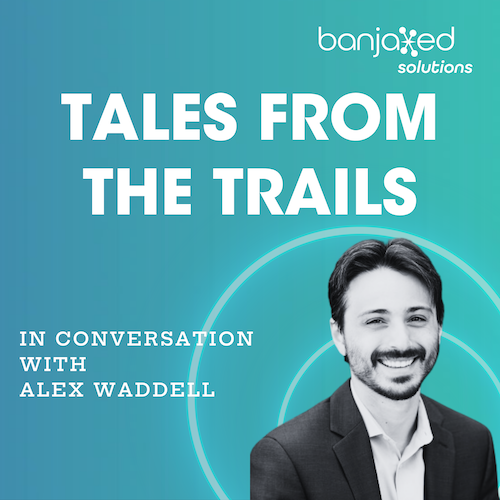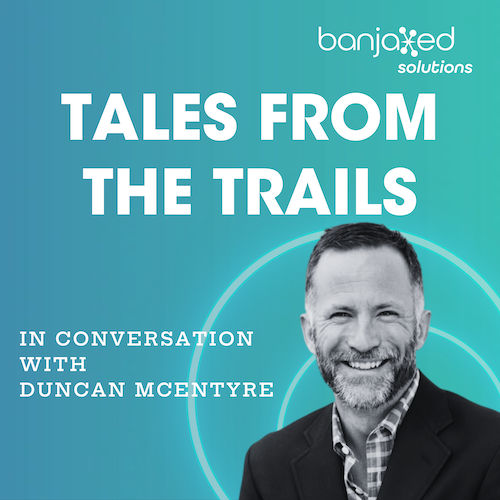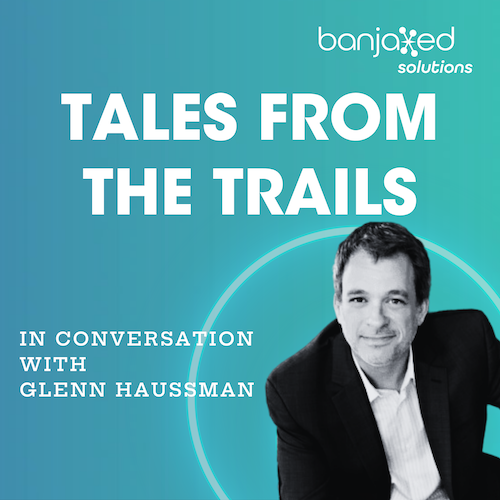
Guest: Alex Waddell, CIO, Adobe Population Health
The last thing you want as a business owner or service provider is to hear your customers’ needs are going unanswered, especially when you have the ability to meet them. Without a full picture of your client data, these individuals may go without the basic necessities for thriving in our society.
When it comes to overall public health, there are lot of statistics, but rarely are they consolidated, analyzed, and applied to serving everyone in the community. Luckily, Salesforce is now powering an innovation that bridges this gap between healthcare data and services.
Meet Alex Waddell and explore how Adobe Population Health harnesses Salesforce’s renowned data engine and service platform to address community-wide health needs.
Today, Alex shares his journey from an unexpected start in economics to becoming a Salesforce guru in the healthcare data industry. He and his team at Adobe Population Health seek to reshape healthcare data collection and analysis to bridge gaps and improve patient care. Learn how they ingeniously built their EMR system on the Salesforce platform, optimizing large-scale community healthcare data management in four states (and counting!)
Healthcare Data Revolutionized on Salesforce
Don’t have time for the full episode? Here’s what you need to know:
The Highlights
0:40 - It really depends on who you ask. Some would say it's a tool that can do anything. To give you the elevator pitch, it's a platform and customer relationship management system in which some of the largest customers in the world run their business. When someone asks me or doesn't exactly know what Salesforce is, I always like to say, it's “Hey, you have a phone?” and typically they say, yes, and I'll say “If you have 'T Mobile', 'AT&T’, 'Verizon', odds are you're at some point being touched by Salesforce. When you're calling, someone's logging your case or your ticket on Salesforce.” That's the best way to describe it.
1:24 - Currently a lot of my responsibilities focus around making sure that our customers are successful with their implementations. Anything around solution design, making sure that we're scoping the right design and solutions for our customers and then helping with the delivery of that. What that looks like is typically a customer will buy Salesforce, and very similar to partners, we help with the delivery or with what we call advisory or assurance services where we tell clients or partners, "Hey, this is what needs to be happening in order for things to be successful." So that's my role. We advise, we solution and then we help with delivery. That would be what I would describe it to in three parts.
2:23 - Correct, and most of us have a specialty, whether it's in a specific industry or specific product. For me, it's centered around commerce and configuring price, quote, and billing tools and currently around manufacturing, but it can be around any industry or any other type of product as well.
2:46 - There's a few things that I worked on from the commerce side, for our product . . . Commerce Cloud. Right now, as we look forward is there's a lot of customers who want the experience of having AI, or in our case, Einstein GPT giving them suggestions, helping them learn what they need down to the point of telling customers what they would want. That's all possible through Commerce Cloud.
3:17 - And then additionally, talking about interesting products is Data Cloud. Data Cloud acts very much as a data aggregator, making it easy for businesses and for customers to have a seamless customer experience. I can elaborate that more but that's what it does.
3:42 - To me, really, it's the people and the culture. I know that sounds very cliche, but really, the people are what make it right. The partners, such as Banjaxed down to my fellow employees, or just anybody that gets on Trailhead, which is our learning management system for what we call Trailblazers. It's a fun and exciting world to be a part of. Showing somebody how to create a report or create a field or an object is very easy.
4:27 - When we think of values, at least to me and to the rest of my peers, is trust. That's the number one value. If you hear our CEO, Mark Benioff talk about it, trust is the most important thing and that's making sure that we not only build, but keep the trust that our customers have in us as well as our fellow employees and our partners. Everyone's like, “Well, what does that look like?” To us it looks like transparency. It looks like inclusion. It looks like just selling what we deliver and delivering what we sell. Managing expectations. That's what I would say is the value that drives us the most, trust.
5:23 - When I first left the military in 2019, I originally joined Oracle NetSuite, which is a great place to work at and very fun and exciting, but I was looking for something a little bit different, more challenging in a EQ type of way, more around managing relationships. I had a good friend mention, “Hey, you should come over to Salesforce.” At first, I wasn't too enthused but I drank the KoolAid and I ended up joining with his help. So that's how it was. It was very much the way companies have an accidental admin, for me, it was an accidental interview at Salesforce and subsequently and luckily obtaining the role.
6:07 - Very similar to what some of our executives would say is, I had a lapse in judgment and left briefly after a year the first time. But then I just recently came back in February of this year. I have been here about 6 months. So in total, I believe I have about a year and six months. They do count the time that I was here the first time as well.
6:46 - I have 32 Salesforce certifications.
6:54 - I usually spend my time studying. Sometimes I would be at the airport. Sometimes I would be at the most random places, like bars or at the restroom. Just anywhere I had a chance to study, I would be on Trailhead, either on my phone or on my computer. Additionally, a lot of the time, it was just about working with other people and helping them achieve their goals. If someone came to me and said, “Hey, I wanna learn Tableau,” I was willing to jump in and study with them.
7:29 - The biggest advice I'd give to someone is, 'Start now!' There's no better time to start than today. Oftentimes people will come to me and say, “I want to get the certification” or “I want to do this”, and I'm like, “What steps have you taken to do that?” So I say, 'Start now!' If you don't know what you want to do or . . . how to get started, just reach out. I reach out to someone and say, “Hey, this is what I know, this is what interests me. Would you mind taking 15 to 30 minutes to talk to me about it?” The amount of times I get reached out to is probably a little bit insane at this point.
8:56 - That's the beauty of it, right? Everyone is willing to help you and just take time out of their day to share something fun and exciting. It just comes down to being open and vulnerable to take the jump.
9:22 - I would say the biggest one here would probably be Data Cloud. As we look at companies and the amount of information that we create per day, most of the time customers come to us or to partners and say, “Hey, how can I leverage this data? How can I manage this data? How can I make it useful to make it a tool instead of something that's burdensome?” DataCloud is gonna help with a lot of those nuances.
9:50 - Some of the other things I would look forward to are features that Salesforce is constantly releasing to make it easier for non-developers to work within Salesforce. Even something as simple as the way you modify an internal page has changed drastically to where you can add it or remove it directly on the page layout instead of having to search for it. I would say just looking for those features, looking for how you can manage and learn data.
10:49 - Right now, I'm focused on this quarter and getting through this interesting project. But honestly, I just see myself still learning, still growing here at Salesforce, a place that I love. [Also] further pursuing my passion for the law and law school and more importantly, just helping others. Helping when someone comes to me and asks me to network or asks me for help with a certification. Yeah, just growing with the company and sharing the knowledge that I have.
11:33 - Obviously there's our big event Dreamforce. . . . but as I like to tell everyone, especially if you're near a major city, if you're in Texas, Dallas, Houston, Austin, there's user groups. And those user groups host in-person or virtual events. It's a great place to network for job hunting. It's also a great place to have some of your questions answered. I can't tell you the amount of times that architects or developers bring questions and just casually throw them in there while they're having a drink. They're like, “By the way, I thought about this question, can you help me?” I spent an hour consulting pro bono. So that's a good one. Then last but not least, if there's not a user group in your city, create one. If you build it, they will come as they say.
Don’t let healthcare data silos keep you from serving your dependents’ needs. Get connected and experience unparalleled customer satisfaction.


